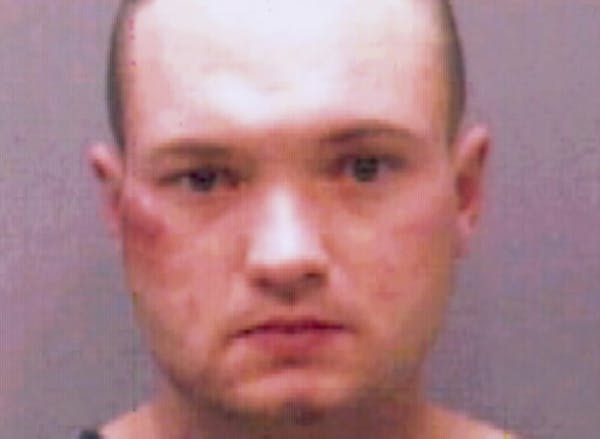Richard Happ readily admits that he has paranoid schizophrenia and says he has learned to deal with the hallucinations that can be triggered by something as simple as a scent. But the violent delusions he suffered when he fatally stabbed his parents in 1999 are in the past, he told a special review panel of Dakota County judges Friday.
Happ, 45, has spent the past 15 years under indefinite commitment as mentally unstable and dangerous at the Minnesota Security Hospital in St. Peter. He progressed to the point where the Department of Human Services in 2012 petitioned for him to be allowed to leave the hospital and live at a licensed, state-operated residential facility in West St. Paul.
At Friday's all-day hearing in West St. Paul, three psychological experts who evaluated the risks of Happ moving to a less-secure environment offered sharply different opinions and perspectives on his chances to succeed. In just a few months, the panel will decide whether days of testimony and hundreds of pages of reports convinced them that he can take the next step and make an acceptable adjustment to open society.
"I don't want to hurt anybody again," Happ said. "I'm not concerned any delusions will take me over."
On March 24, 1999, Richard, then 30, fatally stabbed his parents, Richard H. and Angela Happ, 62 and 59, in their Waconia home. When a Carver County deputy arrived, summoned by a frantic call from Richard's 27-year-old brother David, Richard lunged at the officer with the butcher knife, then broke the locked squad car's window and drove off in the car. Officers chased him 12 miles, arresting him in the parking lot of a Lake Minnetonka restaurant.
Discharges of people indefinitely committed to the Security Hospital as mentally ill and dangerous take place far more frequently than for those committed to the state's sex offender program. The Carver County attorney's office, with the support of David Happ and other relatives, is fighting the provisional discharge, citing concerns about public safety.
Pending the panel's approval, Happ already has been accepted to the residential facility. The judges asked the attorneys for final briefs and findings of fact by Oct. 8, and a decision on Happ's discharge could happen a month later.
Expert opinions differ
The hearing started with testimony from Harry Hoberman, appointed by the court for an independent evaluation of Happ's mental status. He said Happ acknowledged that he can't distinguish between reality and delusion. During his examination, Happ told him that he had killed people and trained with the Navy SEALs, and talked about malevolent beings that take over your soul, Hoberman said.
"The Department of Human Services is representing Happ as a star patient," Hoberman said. "He's not in remission in regards to his schizophrenia. People don't know what's going on in his head."
He noted that Happ had relapsed after being released from previous hospital commitments before the killings. He also believes Happ hasn't reported all of his psychotic episodes to staff members at the hospital. He said he ultimately decided that he couldn't recommend Happ's release to the residential facility.
But Jennifer Hoenke, Happ's psychologist for the past year, said his significant insight into his mental illness and ability to manage risk factors make him an excellent candidate for provisional discharge. Happ has been forthcoming with staffers when experiencing changes in his emotional state and recognizes the need to be on medication, she said.
In 2008, Happ was transferred to St. Peter's nonsecure campus because of his progress. He's earned the right to unlimited passes to leave the facility unsupervised, which he does about three to four times a week. Hoenke said he hasn't had any negative experiences and that the few times he has felt a symptom coming on, he's returned to the campus.
As far as not reporting episodes to the staff, she said that wasn't an expectation. Instead, staffers encourage patients to develop skills to manage symptoms. Happ will never be completely cured, but that shouldn't prevent him from moving on from St. Peter, she said. If granted the provisional release, he would initially be under even closer supervision than he is now.
But Happ's struggles in the past several years, documented in records, were pointed out by Assistant Carver County Attorney Jennifer Tichey. In 2012, he couldn't watch a violent TV show for fear it would bring out a violent hallucination. In July of that same year, his treatment team at St. Peter decided he wasn't ready to be discharged, but several months later, team members changed their minds, Tichey said.
This year, Happ frequently missed work because of mental health issues. He also told the staff he was having hallucinations almost every week, she said.
Martin Lloyd, a forensic examiner who assessed Happ's risk of future violence, supported his discharge. Happ can receive the treatment he needs outside of St. Peter and has few violent delusions, he said. His determination that Happ was a low risk for future violence "wasn't a close call," he said.
'It's hard to forgive him'
Happ, visibly nervous as he testified, said he's being "as honest as he can be" with the hospital staff. The guilt of killing his parents weighs heavy on him. It can be paralyzing at times, which is when he calls in sick for work, he said.
"There isn't a day that goes by that I don't reflect on the damage I've done to my family," he said.
Happ said he now knows his symptoms well and wouldn't hesitate to report problems to the staff of the residential facility.
Carver County Attorney Mark Metz asked him why he wants to leave St. Peter, where he has experienced success in treating his illnesses.
"I want more liberties in my life," he said. "I would like to spend more time with my friends. It would be very rewarding."
Happ said he understands his family's safety concerns. He told Metz he would agree to stay out of Carver County as part of his discharge plan.
During his brother's testimony, David Happ did not look at him, and constantly closed his eyes and sank his head into his hands. After the hearing, David said it is still difficult to deal with his parents' deaths and his brother's possible release. He said he thought Richard's responses sounded coached, and wondered if he was sincere about feeling remorse.
"My parents aren't here because of him," David Happ said. "It's hard to forgive him."
David Chanen • 612-673-4465

In Grand Rapids, Itasca Pride is planning its first event, but there is already pushback
One person shot at YMCA in Coon Rapids

BCA says man pointed pistol-style BB gun at officers before he was shot in Woodbury

Former diversity worker sues University of Minnesota after firing over swastika photo

